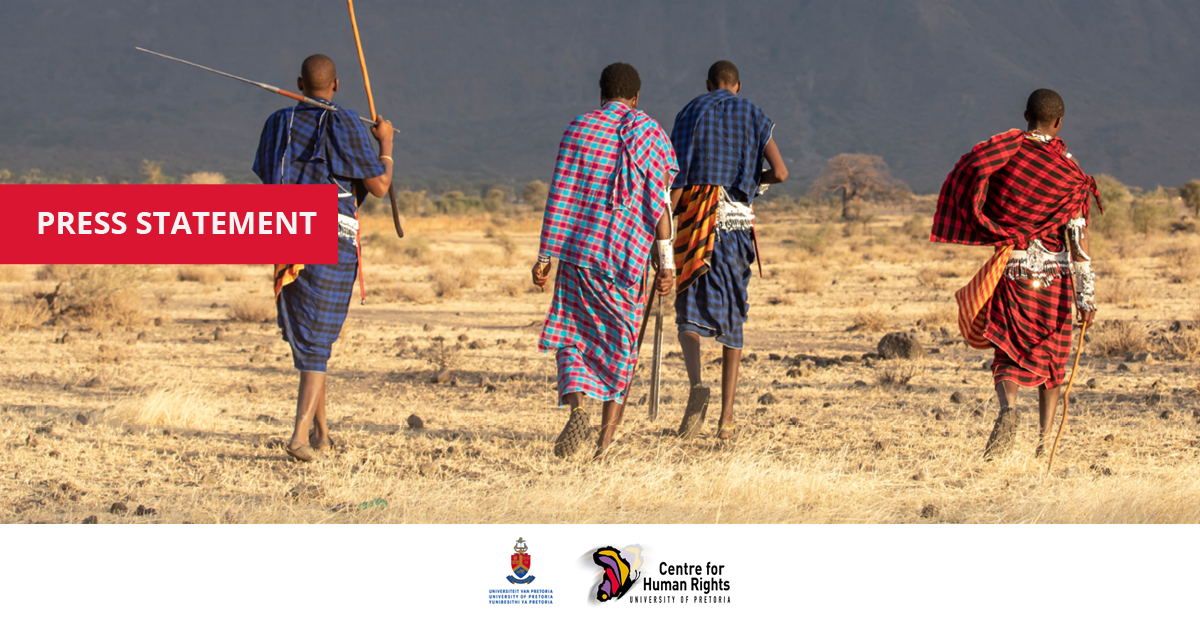The Centre for Human Rights, Faculty of Law, University of Pretoria, condemns the continued mistreatment of the Maasai indigenous people in the United Republic of Tanzania. Over the years, the illegal and forced evictions of this indigenous group from the Ngorongoro Area have resulted in over 80,000 people being deprived of access to settlement and grazing lands on which their pastoral livelihoods depend.
The Centre associates the Maasai mistreatment with the Tanzania Government’s agreements with various biodiversity actors to use the land for conservation and commercial hunting. This elevation of tourist and conservation considerations above fundamental human rights contradicts the letter and spirit of international human rights law and the country’s Constitution.
Articles 9, 12 and 13 of the Constitution of the United Republic of Tanzania state the country’s commitment to equality, human dignity, justice and respect for human rights. Article 16 provides for respecting and protecting one’s person, family, property and residence. Article 24 guarantees the protection of one’s property and deems it unlawful to deprive one of the same without the authority of law. The treatment of the Maasai people by the Tanzanian authorities is, therefore, a clear violation of the Constitution of the United Republic of Tanzania in addition to Articles 17 and 25 (1) of the Universal Declaration of Human Rights that is applicable in Tanzania. It also contravenes provisions of the United Nations Declaration of the Rights of Indigenous People. The absence of national laws recognising Indigenous people leaves them vulnerable to the activities of multinational corporations with the acquiescence of the state. It puts the Maasai and other indigenous groups at risk of being stripped of not just their homes but their ways of life and connection with their land and environment without their consent.
General Comment no. 26 (2021) by the Committee on Economic, Social and Cultural Rights (CESCR) on land and economic, social and cultural rights identifies a core obligation of States to obtain free, prior and informed consent (FPIC) where Indigenous People are to be relocated from their ancestral land, or where there is a potential conflict necessitating a balance between conservation, industrialisation and indigenous peoples’ rights.
While some Maasai people have been forcefully relocated, the Centre is aware that those who are opposed to the idea face police brutality and lack of social services within the Ngorongoro area. The state’s imposition of strict livelihood restrictions on the Maasai in Ngorongoro, downgrading of a public hospital to a clinic and discontinuing the services of all government nurses, therapists and specialists therein is also noted and considered objectionable.
The Centre, therefore, calls upon President Samia Suluhu Hassan and her government to end this oppression and marginalisation. The need to respect and recognise the rights of the Maasai is at this moment emphasised, and the Centre echoes the words of UNESCO World Heritage Director Lazare Eloundou Assomo, who called on the United Republic of Tanzania to “stop the eviction of the Maasai people under the guise of conservation”.
The Centre for Human Rights strongly condemns these actions and urgently calls on the government of the United Republic of Tanzania to:
- Ensure the recognition of the Maasai and all other Indigenous people through legislative measures
- Cease police brutality, forced evictions and displacement of the Maasai in the Ngorongoro Conservation Area
- Respect, protect and promote the rights to life, dignity, property and human dignity of the Maasai including seeking consultations and consent.
- Restitute the land confiscated from the Maasai and compensate them for the displacement and the gross human rights violations suffered
- Re-establish and maintain access to health and social services in the Ngorongoro Conservation Area
- Disclose the whereabouts of all arrested Maasai community members and ensure that all proceedings are following the law
- Take all necessary measures to preserve the rule of law and protect human rights in accordance with the Constitution and international law
For more information please contact





